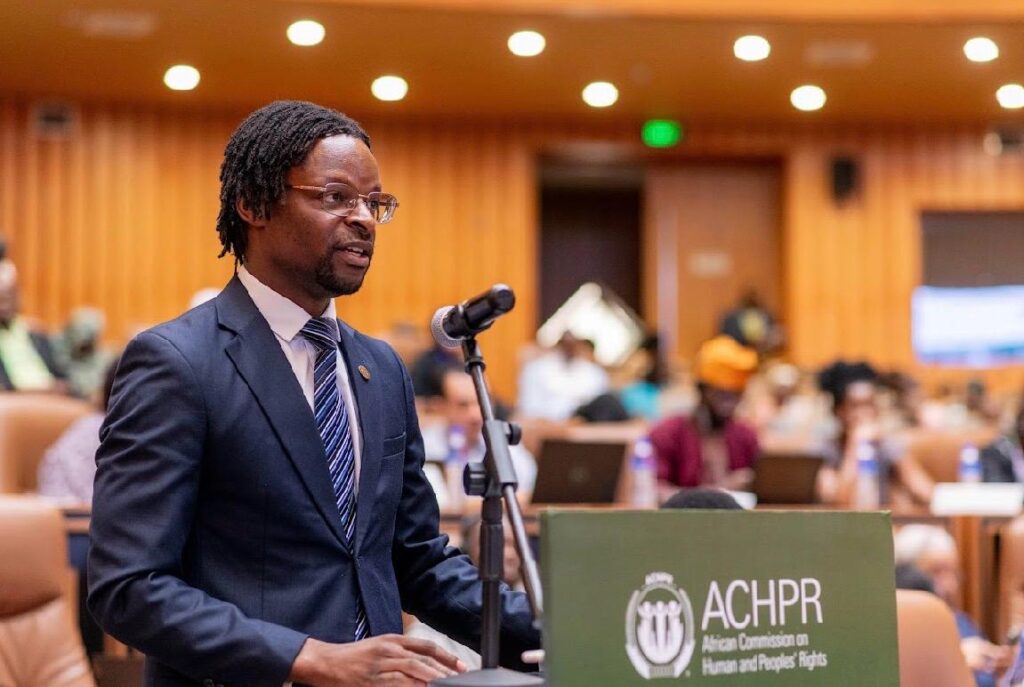
Honourable Chairperson, Honourable Commissioners, Distinguished Delegates,
We thank you for the opportunity to speak at this 85th ordinary session of the Commission.
Honourable Chairperson,
The Institute for Human Rights and Development in Africa is deeply concerned by the ongoing conflict in Sudan and the Democratic Republic of Congo (DRC). These conflicts have resulted in massive displacement, systematic attacks on civilians, and grave violations of international human rights and humanitarian law. The Commission’s own Virtual Joint Fact-Finding Mission report on Sudan, launched at this 85th Ordinary Session, authoritatively documents serious and massive human rights violations, including indiscriminate attacks, extrajudicial killings, conflict-related sexual violence, and ethnically motivated atrocities perpetrated by both the Sudanese Armed Forces (SAF) and the Rapid Support Forces (RSF).
In light of these definitive findings, we urge the Commission to intensify its efforts to ensure the implementation of its own recommendations, and specifically to call on the warring parties to:
- Immediately enact a cessation of hostilities, halt indiscriminate attacks on civilians, and fully comply with international humanitarian law, as urgently recommended by the Fact-Finding Mission.
- End the targeting of individuals and communities based on their ethnicity or perceived allegiances, which the report has established as a pervasive pattern of violation.
In eastern DRC, renewed fighting particularly in North and South Kivu provinces has displaced millions and left civilians facing daily violence. Recent reports now indicate that the crisis has created an alarming food emergency. Nearly 8 million people are now in acute food insecurity, with more than 2 million at risk of starvation. We urge the Commission to call on DRC to:
- Support ongoing peace initiatives, including those under the joint EAC-SADC framework and AU mechanisms; and
- Take urgent measures to address food insecurity in conflict-affected communities.
We would also like to draw the Commission’s attention to the violent dispersal of protests in Togo in June 2025. Reports suggest that unlawful killings, enforced disappearances, torture, and arbitrary detention, are part of a recurring pattern of repression in Togo, deliberately aimed at silencing dissent. The 2011 Law on Peaceful Assembly significantly restricts the right to peaceful assembly and gives the authorities broad powers to limit or ban public protests.
We urge the Commission to call on Togo to:
- Review and amend its legislation on public assemblies to ensure compliance with Article 11 of the African Charter and the Commission’s Guidelines on Freedom of Association and Assembly in Africa;
- Prosecute and hold accountable all individuals, including members of security forces, responsible for human rights violations during the protests; and
- Ensure that individuals detained in connection with the protests are treated humanely, with full access to legal counsel and fair trial guarantees.
Further, we are alarmed by the severe environmental damage caused by mining and extractive industries on the continent. In Ghana illegal gold mining has led to the destruction of forests, farmlands and water bodies. Over 60% of Ghana’s water bodies are polluted, with many in critical condition. In the DRC, cobalt mining continues to contaminate water sources and destroy biodiversity. In Kabwe, Zambia, decades of lead and zinc mining have left a legacy of toxic waste. Over 100,000 residents, including children, suffer from lead poisoning. This has caused severe health issues in children, including developmental delays, learning difficulties, and long-term neurological damage.
We urge the Commission through its Working Group on Extractive Industries, Environment and Human Rights Violation to call on States to:
- Strengthen environmental regulation and enforcement in the extractive sector;
- Hold companies accountable by requiring transparent environmental and social impact assessment, continuous monitoring of pollution and clean-up of contaminated sites;
- Protect affected communities by ensuring access to medical screening and treatment, clean water and safe livelihood.
Recognizing the importance of holding State and non-State actors accountable for human rights violations, IHRDA commends the Joint Complementarity Retreat held with the African Court in June 2025, and welcomes the adoption of the Guidelines on Submission and Transfer of Cases. At a time when withdrawals from the Article 34(6) Declaration of the African Court Protocol pose a serious threat to access to justice on the continent, this decisive action to clarify the collaborative framework between the Court and the Commission is both timely and commendable. This step reaffirms the collective responsibility of both institutions to safeguard accountability and ensure access to redress. We urge the Commission to:
- Finalize the remaining provisions to be included in the Guidelines, specifically concerning the respective considerations and criteria for submitting and transferring cases, to ensure clarity and predictability for litigants and civil society.
Finally, we remain deeply concerned about the persistent challenge of non-compliance by States with the decisions of the Commission. Limited implementation not only weakens the protection afforded to victims but also diminishes the effectiveness of the regional human rights system as a whole. Strengthening compliance is therefore not merely an administrative task, it is an opportunity to reinforce the authority of the Commission, consolidate the rule of law, and ensure that the rights guaranteed under the African Charter are given full and practical effect.
We therefore urge the Commission to:
- Demand state-specific action plans with measurable timelines to ensure decisions are implemented; and
- Work closely with NHRIs and civil society to monitor progress and hold States accountable for inaction;
Thank you for your attention.

